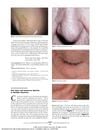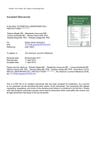 July 2003 in “Journal of Cutaneous Medicine and Surgery”
July 2003 in “Journal of Cutaneous Medicine and Surgery” Some medications can improve skin conditions, while lifestyle factors like smoking and drinking may worsen them; treatments like monoclonal antibodies and imiquimod cream show promise for certain skin diseases.
5 citations,
January 2016 in “Indian dermatology online journal” A 25-year-old man with multiple skin tumors was successfully treated with acitretin and methotrexate.
 30 citations,
April 2018 in “Experimental Dermatology”
30 citations,
April 2018 in “Experimental Dermatology” The article concludes that developing in vitro models for human hair structures is important for research and reducing animal testing, but there are challenges like obtaining suitable samples and the models' limitations.
 28 citations,
May 1978 in “Archives of dermatology”
28 citations,
May 1978 in “Archives of dermatology” Alopecia mucinosa on the face can be linked to mycosis fungoides, a type of lymphoma.
 5 citations,
July 2023 in “International Journal of Women’s Dermatology”
5 citations,
July 2023 in “International Journal of Women’s Dermatology” Anifrolumab significantly improved skin lesions and hair regrowth in severe discoid lupus.
 60 citations,
July 2011 in “Stem Cells and Development”
60 citations,
July 2011 in “Stem Cells and Development” Certain signals and genes play a key role in hair growth and regeneration, and understanding these could lead to new treatments for skin regeneration.
 518 citations,
November 2014 in “Science”
518 citations,
November 2014 in “Science” Skin grafting and wound treatment have improved, but we need more research to better understand wound healing and create more effective treatments.
 12 citations,
January 2017 in “Skin appendage disorders”
12 citations,
January 2017 in “Skin appendage disorders” Two patients with skin lupus were mistakenly thought to have a different scalp condition but improved with lupus treatment.
 July 2018 in “Elsevier eBooks”
July 2018 in “Elsevier eBooks” Discoid Lupus Erythematosus often causes scarring hair loss, is influenced by genetics and environment, and requires early treatment to prevent worsening.
 17 citations,
September 2003 in “Journal of Investigative Dermatology Symposium Proceedings”
17 citations,
September 2003 in “Journal of Investigative Dermatology Symposium Proceedings” Old treatments for other skin conditions showed promise for hair regrowth in mice with a hair loss condition.
 2 citations,
October 2016
2 citations,
October 2016 Chemotherapy and radiotherapy can cause skin side effects like rashes, hair loss, and nail changes, which are usually managed with conservative treatments.
 182 citations,
December 2007 in “BJCP. British journal of clinical pharmacology/British journal of clinical pharmacology”
182 citations,
December 2007 in “BJCP. British journal of clinical pharmacology/British journal of clinical pharmacology” Hair follicles significantly increase the speed and amount of caffeine absorbed through the skin.
 July 2003 in “Journal of Cutaneous Medicine and Surgery”
July 2003 in “Journal of Cutaneous Medicine and Surgery” Various skin conditions like cutaneous lupus erythematosus, psoriasis, and basal cell carcinoma can be effectively treated with antihypertensive agents, NB-UVB phototherapy, and imiquimod cream respectively. Vaccines are effective against genital herpes and HPV-16 infection. Early intervention is crucial for conditions like diabetic foot ulcers and neonatal herpes. Certain dyes can cause hand dermatitis, and there's a link between smoking/drinking and psoriasis in men. No direct link was found between low iron levels and chronic hair loss in women.
 22 citations,
July 2003 in “Military medicine”
22 citations,
July 2003 in “Military medicine” New treatments are available for managing ingrown hair inflammation.
 155 citations,
March 2009 in “Seminars in Cutaneous Medicine and Surgery”
155 citations,
March 2009 in “Seminars in Cutaneous Medicine and Surgery” Scalp cooling might reduce hair loss from chemotherapy, but evidence is weak and other treatments are being tested.
 19 citations,
December 2006 in “Archives of dermatology”
19 citations,
December 2006 in “Archives of dermatology” Hair casts and cutaneous spicules can be signs of multiple myeloma.
 July 2003 in “Journal of Cutaneous Medicine and Surgery”
July 2003 in “Journal of Cutaneous Medicine and Surgery” Certain drugs can cause lupus, stopping these drugs is the main treatment. NB-UVB phototherapy clears psoriasis faster when applied three times a week. Monoclonal antibodies and oral pimecrolimus are effective in treating psoriasis. Smoking and drinking are linked to psoriasis in men. No direct link between low iron and hair loss was found. Vaccines are effective against genital herpes and human papillomavirus type 16.
 2 citations,
January 2014 in “Advanced Biomedical Research”
2 citations,
January 2014 in “Advanced Biomedical Research” Oral isotretinoin and cyproterone compound are equally effective for treating acne in women with cutaneous hyperandrogenism.
 24 citations,
September 2015 in “JAAD case reports”
24 citations,
September 2015 in “JAAD case reports” Finasteride helps hair regrowth in frontal fibrosing alopecia.
 124 citations,
July 2012 in “Archives of Dermatological Research”
124 citations,
July 2012 in “Archives of Dermatological Research” Targeting androgen receptors could be a promising way to treat skin disorders with fewer side effects.
 54 citations,
June 1990 in “Journal of The American Academy of Dermatology”
54 citations,
June 1990 in “Journal of The American Academy of Dermatology” HIV can cause various severe or unusual skin conditions that help indicate the presence and stage of the disease.
 30 citations,
June 2006 in “British journal of dermatology/British journal of dermatology, Supplement”
30 citations,
June 2006 in “British journal of dermatology/British journal of dermatology, Supplement” Oral zinc sulphate reduces dark hair color in mice.
 28 citations,
December 2013 in “British Journal of Oral & Maxillofacial Surgery”
28 citations,
December 2013 in “British Journal of Oral & Maxillofacial Surgery” The document concludes that understanding the anatomical changes of the ageing face is important for effective rejuvenation treatments.
 52 citations,
February 2006 in “Archives of Dermatology”
52 citations,
February 2006 in “Archives of Dermatology” Alefacept may effectively treat severe lichen planus, with patients showing significant improvement and no side effects.
18 citations,
August 2013 in “Journal of Feline Medicine and Surgery” Cats can get skin issues from things other than fleas, like insect bites, food, or allergens.
 3 citations,
May 2018 in “The American Journal of Medicine”
3 citations,
May 2018 in “The American Journal of Medicine” A woman's long-term scalp issues were diagnosed as a rare skin disorder called cutaneous Langerhans cell histiocytosis.
 June 2002 in “Seminars in Cutaneous Medicine and Surgery”
June 2002 in “Seminars in Cutaneous Medicine and Surgery” Hair transplantation has improved to more natural-looking results and is complemented by effective non-surgical treatments, with ongoing research into hair follicle cloning.
 19 citations,
November 2016 in “Dermatology and therapy”
19 citations,
November 2016 in “Dermatology and therapy” Stopping the medication infliximab and starting new treatments helped a woman's hair grow back and improved her scalp condition.
33 citations,
October 2013 in “Cutaneous and ocular toxicology” Oral cyclosporine can help regrow hair in severe alopecia areata cases.
 August 2001 in “Journal of Cutaneous Medicine and Surgery”
August 2001 in “Journal of Cutaneous Medicine and Surgery” Prednisone has risks for lupus patients, isotretinoin is safe for mental health, transplant patients risk skin cancer, and various treatments are effective for specific skin conditions.



























